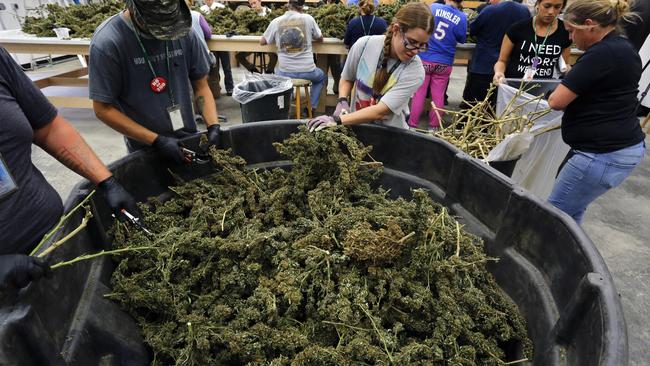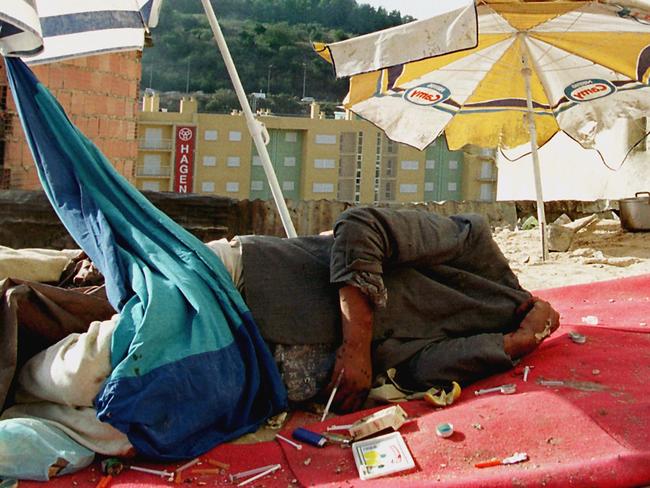‘Decriminalising drugs will save our kids’
SMARTPHONES can do all sorts of amazing things, but for Louisa Simmonds’ son, they only made it harder to escape his dark past.

OPINION
NO PARENT likes the idea of their kids using drugs. Drugs sit at the top of the list of experiences that we pray our kids will NEVER do, like dropping out of school or getting a tattoo.
That’s why, when I saw the thin blue line that indicated my son’s impending arrival, I didn’t envisage the journey that lay ahead.
No, I experienced the smug expectations of any middle-class mother. I made plans for him to pass each developmental milestone with flying colours, to graduate with honours and lead a happy, successful life.
Sadly, what that scan didn’t show me were the mental health issues that would lead him to self-medicate with drugs.
Every day we hear stories in the media of professionals snorting cocaine in club toilets and young kids popping pills at festivals. Thanks to technology, drugs can be ordered by phone and delivered to their door.
That same technology has made our kids more vulnerable to mental illness, by exposing them to the pressures of social media and an expectation to be on call around the clock.
Evidently, prohibition isn’t working. People still use drugs, and with our greater understanding of addiction, I wonder if it is really fair to treat recreational users as criminals.
Current drug laws in New South Wales mean my son is seen as a criminal in the eyes of the law, even though we know that mental illness makes young people feel like outsiders and that many will turn to self-medication to cope with that sense of isolation.
Kids like him take anything they can lay their hands on to feel something — marijuana, MDMA, crushed-up Ritalin, even the fumes from aerosol sprays.

But instead of labelling those struggling with addiction as criminals, we could take a whole new approach, and decriminalise drugs. It’s not as radical as it seems. Other countries, such as Portugal and certain states in the US have gone down the same path.
They’ve found a decline in people using drugs on a regular basis, fewer cases of HIV, less drug-related crime and violence on the streets, and fewer deaths from drugs that haven’t been screened.
HOW WOULD DECRIMINALISATION HELP OUR KIDS?
Let’s clear this up right here. Decriminalisation does not make it legal for those cockroach dealers to sell drugs.
I’m using the word cockroaches for a reason. People who target the most vulnerable people in society need to be locked away. Every time my son has tried to stop using he’ll be sent a text reminding him about the latest batch. It’s incredibly difficult for him to escape.
But decriminalisation would mean the end users of common, illicit drugs aren’t doing something illegal.
We are fortunate that Australia has a harm-minimisation approach to marijuana that varies slightly from state to state. Nevertheless, if your child is caught in possession of the drug in NSW today, (or any other common illicit drug), they could be fined, given a criminal record, or maybe even jail time.
MORE: Hardly anyone dies from drug overdoses in decriminalised Portugal
MORE: Richard Di Natale on how his time as a doctor formed his view on drugs
Changing the law will keep these people out of jail.
It will also reduce valuable time wasted on policing minor drug offences — our police officers will then have more time to focus on catching the real criminals — those who supply.
Throwing drug addicts in jail costs a lot of money. That money would be better spent on funding services such as rehabilitation and re-education. Any parent that has been down the road of trying to secure a place for their kid in a state rehabilitation program will understand the dire need of that extra funding.
And finally — importantly — there’ll be fewer deaths from unregulated drugs if users feel safe to get their pills screened, and to call in overdoses.

WILL DECRIMINALISATION TURN MY CHILD INTO AN ADDICT?
No. If your child is the small percentage of kids with a biological predisposition towards drugs, decriminalisation will change very little other than offer them increased support and rehabilitation services.
Sydney doctor Ratna Neville told news.com.au that decriminalisation could help kids access services they’re currently not using for fear of being prosecuted.
“We see kids that use cannabis to self-medicate all the time,” she said. “While more kids with mental health issues are seeking professional help, the services available to support them can’t currently meet demand.
“It has been demonstrated in other countries that decriminalisation does not increase drug use, but it does provide a better standard of care for those kids that become addicted.”
THE LONG TERM VIEW
It is time for a change in society’s views on drugs and for us to evolve with youth culture.
Most kids will experiment with drugs in the same way that they experiment with alcohol, without becoming addicted. I would like to see a change in the narrative around the use of drugs for the sake of those kids that use for the purposes of self-medication.
We need to view substance abuse as a disease or ‘a condition that requires continuous treatment’ (drugabuse.com), rather than a crime. That will prevent kids like mine from being labelled at the start of their lives, and give them a fighting chance at rehabilitation.



